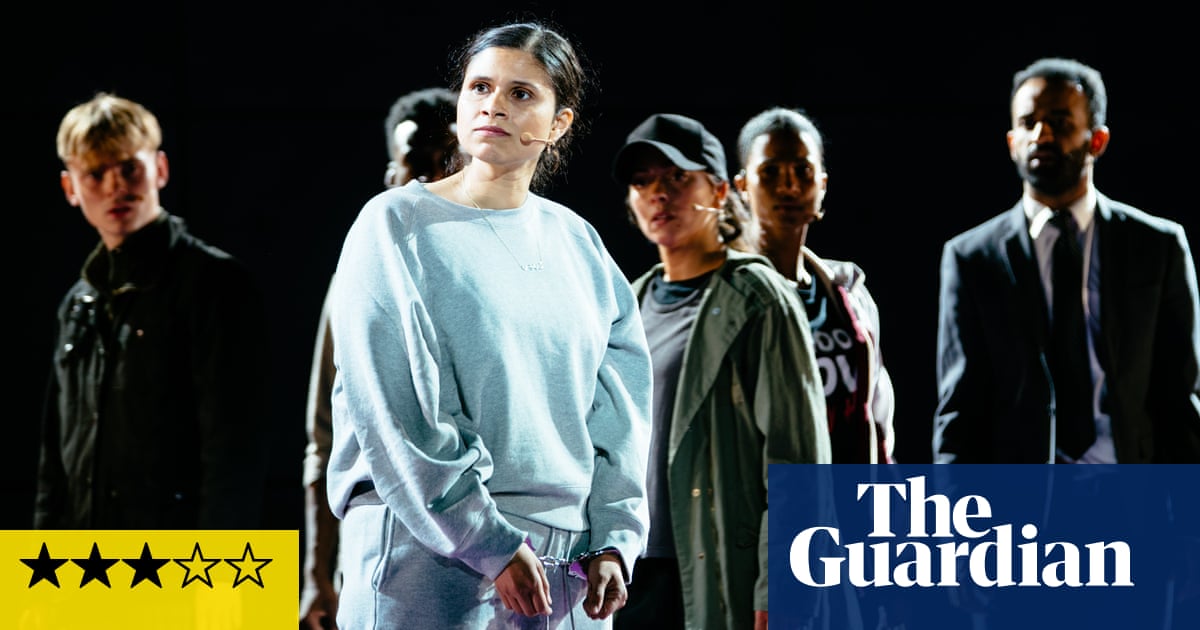
Show caption Reluctant rebel … Zainab Hasan as Antigone in a new version by Inua Ellams at Regent’s Park Open Air theatre, London. Photograph: Helen Murray Theatre Antigone review – a poetic tragedy about modern British Muslim life Regent’s Park Open Air theatre, London
Inua Ellams updates the Sophoclean drama into a beguiling piece about faith and prejudice, and casts a suspicious eye at politicians who betray their own communities Arifa Akbar @Arifa_Akbar Sun 11 Sep 2022 12.57 BST Share on Facebook
Share on Twitter
Share via Email
Inua Ellams’s Antigone is the drama of unjust law and righteous rebellion that we know from Sophocles’s Theban cycle … but refitted for our times. The story of Antigone’s lone stand against the state is updated to the here and now with a British Pakistani Muslim family at its heart, embattled in a nation roiling with Islamophobia and prejudiced policing.
Creon is the country’s first Muslim prime minister, making anti-terrorism laws that supersede international codes of conduct. It is this that denies Polyneices his burial rights after he is radicalised and dies in Syria.
Directed by Max Webster and Jo Tyabji, this is an incredibly dynamic production with a youthful energy, a striking lead in Zainab Hasan, and plenty of wow in its stagecraft. Its script is not perfect and not every main character is fully-fleshed, but the production finds its power in music and big theatre optics.
Contemplative moments … Antigone by Inua Ellams. Photograph: Helen Murray
Like Kamila Shamsie’s Women’s prize-winning novel Home Fire, which was also inspired by Antigone, Ellams channels a rich and relevant parallel in the transposition to modern-day British Muslims. A meaty and discursive topicality runs through the play, from discussions on the government’s Prevent strategy to the west’s obsession with the hijab, and ideas of statelessness and citizenship that have echoes of Shamima Begum’s story. Tiresius (Eli London) is cleverly updated to become a tech whiz in a hoodie whose seer’s gifts come through data analysis, while the clash between Creon’s man-made law and divine rights is tackled deftly.
The production seems unique in how it depicts Islam: it is most contemplative in moments of spiritual ritual, ablution and prayer spoken in Quranic Arabic, which show Islam to be first and foremost a faith – and a beautiful one – over a system of politics or symbol of identity.
What we do not dwell on is character. The early scenes are too short and functional. The plot is cranked out at quite a rate in stops and starts, and characters spell out all their motivations. And there is not always enough dramatic intensity in the spoken scenes: the relationship between Haemon (Oliver Johnstone) and Antigone is anaemic, and Eurydice (Pandora Colin), who is Creon’s wife and political adviser, is undercharged in her maternal role.
Propulsive and poetic … the chorus. Photograph: Helen Murray
But Ellams’s script excels in the lyrical pauses between spoken dialogue, with a chorus that dances and sings or raps in verse. The effect is propulsive and poetic, in combination with Michael “Mikey J” Asante’s addictive music, Carrie-Anne Ingrouille’s catchy choreography and Jack Knowles’s dynamic lighting. We wait for the chorus to emerge and they never disappoint, making this show feel like Antigone: The Musical in the best possible sense.
Antigone herself is a well-formed part strongly delivered by Hasan: a reluctant rebel in jeans and bandana. Creon, in Tony Jayawardena’s hands, is just as strong and entertainingly villainous. “Yes I can,” he says, twisting Obama’s campaign slogan for his own selfish ends while the play casts a glance at politicians of colour, from Sajid Javid to Priti Patel, who are accused of betraying their own communities with hostile policies towards immigration, race and religion.
The throb and thrill of the staging is beguiling, along with the clean visual magnificence of Leslie Travers’s set design, which literally throws its opening set off the stage and uses emptiness to maximum effect with fire, smoke and spotlighting. The emotional voltage of the final tragedy is not delivered but this is exciting and extremely watchable theatre nonetheless.
• At the Open Air theatre, London, until 24 September.







